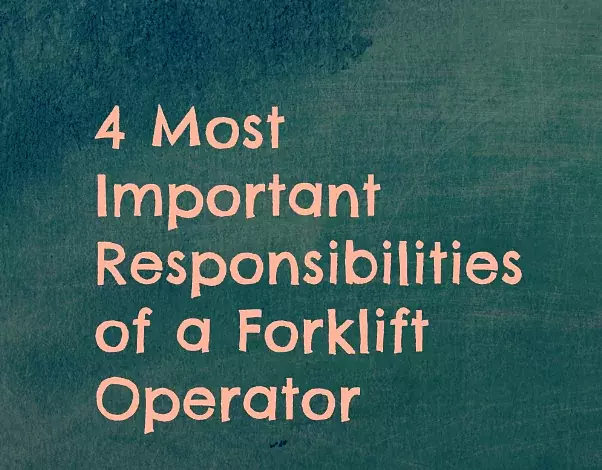 Operating a forklift is a great responsibility. While there are many functions and duties associated with operating a forklift or in material handling assignments in general, there are several responsibilities which should be a priority. There are many different ways to handle a forklift and a diverse array of different vehicles. Nevertheless, there are fundamental responsibilities which are paramount, here are the four most important responsibilities of a forklift operator:
Operating a forklift is a great responsibility. While there are many functions and duties associated with operating a forklift or in material handling assignments in general, there are several responsibilities which should be a priority. There are many different ways to handle a forklift and a diverse array of different vehicles. Nevertheless, there are fundamental responsibilities which are paramount, here are the four most important responsibilities of a forklift operator:
Inspecting Forklift Before Operation
A forklift operator should inspect the forklift before operations begin. First, the operator must check both the fuel and voltage levels before operation. Failing to do so can result in malfunction of the machinery and ultimately result in collateral damage to goods or injury to personnel. Another key survey is the hydraulic oil. Hydraulic oil permits the forklift to raise and lower its lift platforms throughout operation. A responsible forklift operator should check hydraulic oil to prevent accidents during usage. It is worth mentioning that inadequate amounts or bubbly hydraulic oil can result in an immediate failure of the mechanisms. Finally, it is also crucial to check other fluids that will enhance use of the vehicle and also check some of the parts to make sure they are not worn or damaged.
Be Attentive
Situational awareness is one of the most important components of the job. In any material handling operation, it is imperative to monitor the factory or warehouse floor at all times. Forklift operators should always keep their eyes focused in front of them, constantly surveying the area for potential hazards. Due diligence and strategies like these are the surest and most proactive measure in preventing workplace accidents.
Continuous Safety Training
The best forklift operators are committed to maintaining up-to-date knowledge of industry-leading safety practices. To complement this, it is prudential for any forklift operator to drive efficient yet safe workplace methodologies and lead the way in promoting an environment that values the welfare of personnel. This is most important when you consider the gravity of using a heavy machine such as a forklift, a device that can easily cause injury or death if not properly used in appropriate faculties. In addition to safety awareness, a forklift operator should likely retain certifications in various material handling capacities to further drive safe operations.
Communicate Effectively With Team
Communication is the foundation of teamwork. It is imperative for forklift operators to communicate with the rest of the crew. Use of lights and signals to alert others is a key to workplace safety. Use of a backup alarm can serve as an excellent means of alerting all in close proximity that the operator is backing up. This can be rudimentary, as the operator may not be able to notice a laborer behind the forklift due to blind spots. Finally, it is a fundamental that any forklift operator maintains consistent verbal communication with colleagues and partners, this is the most effective and efficient way to master any assignment or project.
